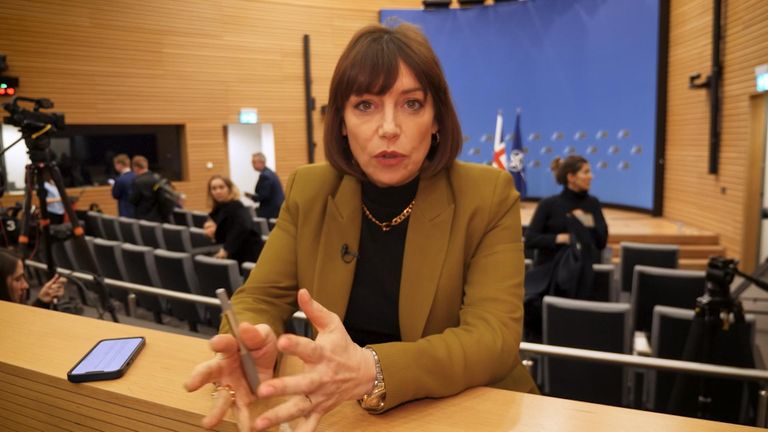China hits back after new US tariffs take effect
China has retaliated after the US imposed 10% tariffs on its goods.
Not long after the US taxes began at 5am British time, China said it was imposing 10% tariffs on American crude oil, agricultural machinery, large-displacement cars and pickup trucks.
There will also be 15% tariffs on coal and liquefied natural gas, as well as an investigation into Google.
China also said it is imposing export controls on rare earth metals such as tungsten, tellurium, ruthenium, molybdenum and ruthenium-related items – the country controls much of the world’s supply of such metals, which are critical for the transition to clean energy.
They will not come into effect until Monday 10 February, however.
President Trump said his actions were in response to what he described as Beijing’s failure to stop the flow of fentanyl, a synthetic opioid, into the US.
Mr Trump added that the tariffs on China could just be the start, though the White House said he was due to talk to President Xi Jinping.
“China hopefully is going to stop sending us fentanyl, and if they’re not, the tariffs are going to go substantially higher,” Mr Trump said.
China has described fentanyl as America’s problem and said it would challenge the tariffs at the World Trade Organisation, as well as taking other countermeasures.
But it also left the door open for talks.
The issue of fentanyl is only one part of Mr Trump’s issue with China. He has long railed against the trade imbalance between the first and second-largest economies in the world.
Tariffs paused
Earlier, the imposition of 25% tariffs on Mexico and Canada was paused after agreements were reached on border security.
Mexico was first to make a deal with the White House. Its president, Claudia Sheinbaum, said she was sending 10,000 National Guard troops to the US border immediately in return for a tariff delay.
Mr Trump said the Mexican soldiers would be “specifically designated” to stop the flow of fentanyl into the US, as well as illegal migrants. Further negotiations will now be carried out, he added.
Ms Sheinbaum said she had a “good conversation” with him lasting at least 30 minutes just hours before the tariffs were due to begin.
She also extracted a concession from Mr Trump – after explaining the “seriousness” of high-powered weapons coming over the border from the US and getting into the hands of criminal groups.
“It gives them firepower,” she said. “We asked that the US also help our country by helping stop this arms trafficking… he agreed.”
👉 Follow Trump 100 on your podcast app 👈
Canada made similar moves. Prime Minister Justin Trudeau said almost 10,000 frontline personnel “are and will be working on protecting the border”.
He added on X that his country was appointing a “fentanyl czar”, drug cartels would be listed as terrorists, and there would be “24/7 eyes on the border”.
There will also be a Canada-US joint strike force to “combat organised crime, fentanyl and money laundering”, Mr Trudeau announced.
Both Mr Trudeau and Mr Trump will view the deal as a win – Mr Trump for seemingly forcing the US’s northern neighbour to act, and Mr Trudeau for heading off sanctions with measures that for the most part (with the exception of the fentanyl czar) had already been announced in December.
Mr Trump said he was “very pleased with this initial outcome” and work will begin to see how a “Final Economic Deal” with Canada can be structured.
What is the UK situation on tariffs?
President Trump hates trade deficits, and does not want to import more goods from another country than are sent there in return, says Sky’s economics and data editor, Ed Conway.
But Britain has bigger trade deficits than the US, Conway adds, and is one of the few countries in the world to import more goods from America than America imports from it.
Read more:
Trump threatens to cut off South Africa funding
Breaking economies could be just first step
In addition, because the UK is no longer part of the European Union, any tariffs imposed on Brussels will not affect London.
When asked about the UK, Mr Trump said: “I think that one can be worked out.”
Sir Keir Starmer said it was “early days”.

